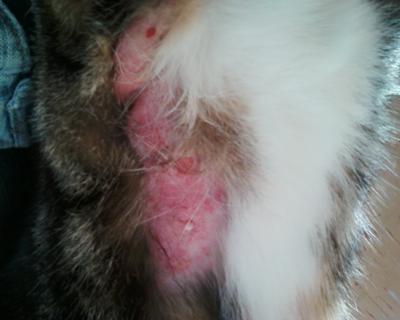How to Stop Excessive and Seasonal Cat fur Licking
by Shan Gower
(Leicester, England)
Hi, I have a two year old short haired female tabby outdoor cat although she never usually ventures far. About a year ago she went missing for about 3 months. When she eventually came back she was extremely thin and had shabby fur, although within a couple of weeks she was back to normal.
A few weeks after that we noticed that she had started excessively licking her fur and that as a result she was getting scabby and losing fur. We took her to the vets at the time. who told us she was infested with fleas.
The veterinarian gave her some antibiotics and flea treatment and a week later the scabs had cleared up. For the last year ever since this episode, every couple of months she has bouts where she starts doing this again.
She does not scratch, but just licks. We groom her all the time and I have parted her fur all over and checked for fleas and found nothing. The problem is now getting worse and she now continues licking the fur to the point where she makes herself bleed.
I am a little reluctant to take her to the veterinarian again only to have them tell me she is infested with fleas when i know she isn't. I am thinking it is some kind of cat skin disorder, but not knowing much about them I thought you could give me some kind of idea before I take her for treatment again.
The areas where she does this are on her side(towards her back end around the stomach area), on the inside of her front leg (although this is a new area) and on her back though she doesn't seem to pull fur from here it just feels a bit scabby.
She is a much loved and sometimes a little spoiled cat. Also on the inside of her leg we noticed some little lumps
Please help
Thanks
Shan
Editor Comment: Cat Licking Fur
A cat with a history of having had a heavy flea infestation is always considered as a carrier for fleas. The expected brownish to reddish flea residue left behind by fleas cannot be detected in cats which are regularly groomed and are affected by
Your cat is probably experiencing a severe case of flea bite allergy dermatitis. This can either be caused by a cat flea infestation or an earlier trigger in the immune system. This is a seasonal allergy, which is more severe in summer and fall. This cat flea condition is seen in a year round cycle, which recurs mostly once in a year or rarely twice in hypersensitive cats.
Most cats with this cat flea problem usually experience this condition for the rest of their life. The only way to prevent this condition is with the use of a spot treatment and by additional steps towards eliminating the chances of any flea growth.
Here, for the time being we recommend that you use a quality anti-flea shampoo such as Clinical Care. Additionally, you can use some remedies to reduce cat skin itchiness such as FleaDerm and to provide some level of comfort to your cat.
Remember, a cat with flea bite allergy dermatitis pulls and chews the fur and ingests flea residues. This cycle continues in the digestive system of the affected cat, which is why such as cat is called a “carrier”.
We also suggest using a natural remedy formulated to help the eradication of digestive parasites including flea residues such as Parasite Dr.
Since your cat's skin is sensitive right now and is prone to more skin problems, we also recommend the use of a herbal cleansing shampoo such as Clean Cat and a skin tonic such as Skin and Coat Tonic.
The eradication of any fleas in your cat's environment is the last measure needed to achieve the complete elimination of the problem. It is very important that all cat belongings and her environment is free of any adult, larvae and flea eggs. Regularly disinfect the environment with a quality disinfectant spray such as Benzarid Spray and wash belongings in hot water with a quality detergent.
We hope these measures will resolve the problem. However, remember that once cats are affected with this type of cat flea allergy dermatitis, they rarely become desensitized to the problem.
Best of luck to you and your cat. Please keep us up to date on your cats condition.
Comments for How to Stop Excessive and Seasonal Cat fur Licking
|
||
|
||

